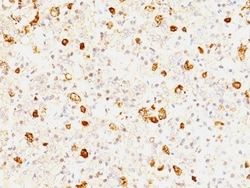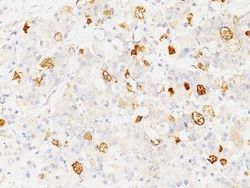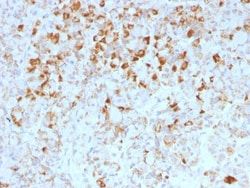LH beta Antibody (LHb/1214), Novus Biologicals™
Manufacturer: Fischer Scientific
The price for this product is unavailable. Please request a quote
Antigen
LH beta
Classification
Monoclonal
Concentration
0.2 mg/mL
Dilution
Flow Cytometry 0.5 - 1 ug/million cells in 0.1 ml, Immunohistochemistry-Paraffin 0.5 - 1.0 ug/ml, SDS-Page, Immunofluorescence 1 - 2 ug/ml
Gene Accession No.
P01229
Gene Symbols
LHB
Immunogen
Recombinant beta sub-unit of human LH
Purification Method
Protein A or G purified
Regulatory Status
RUO
Gene ID (Entrez)
3972
Target Species
Human
Form
Purified
Applications
Flow Cytometry, Immunohistochemistry (Paraffin), SDS-Page, Immunofluorescence
Clone
LHb/1214
Conjugate
Unconjugated
Formulation
10mM PBS and 0.05% BSA with 0.05% Sodium Azide
Gene Alias
CGB4, hLHB, interstitial cell stimulating hormone, beta chain, LSH-B, LSH-beta, luteinizing hormone beta polypeptide, luteinizing hormone beta subunit, lutropin beta chain, lutropin subunit beta
Host Species
Mouse
Molecular Weight of Antigen
22 kDa
Quantity
0.2 mg
Primary or Secondary
Primary
Test Specificity
Luteinizing hormone (LH) is a glycoprotein. Each monomeric unit is a sugar-like protein molecule; two of these make the full, functional protein. Its structure is similar to the other glycoproteins, follicle-stimulating hormone (FSH), thyroid-stimulating hormone (TSH), and human chorionic gonadotropin (hCG). The protein dimer contains 2 polypeptide units, labeled alpha and beta subunits that are connected by two bridges. The alpha subunits of LH, FSH, TSH, and hCG are identical, and contain 92 amino acids. The beta subunits vary. LH has a beta subunit of 121 amino acids (LHB) that confers its specific biologic action and is responsible for interaction with the LH receptor. This beta subunit contains the same amino acids in sequence as the beta subunit of hCG and both stimulate the same receptor; however, the hCG beta subunit contains an additional 24 amino acids and the hormones differ in the composition of their sugar moieties.LH is synthesized and secreted by gonadotrophs in the ante
Content And Storage
Store at 4C.
Isotype
IgG1 κ
Description
- Ensure accurate, reproducible results in Flow Cytometry, Immunohistochemistry (Paraffin), Immunofluorescence LH beta Monoclonal specifically detects LH beta in Human samples
- It is validated for Immunohistochemistry, Immunohistochemistry-Paraffin.



